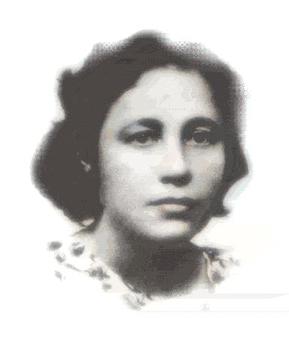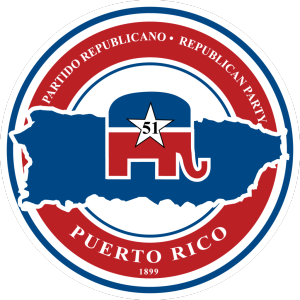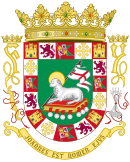
The politics of Puerto Rico take place in the framework of a democratic republic form of government that is under the jurisdiction and sovereignty of the United States Congress as an organized unincorporated territory. Since the 1898 invasion of Puerto Rico by the United States during the Spanish–American War, politics in Puerto Rico have been significantly shaped by its status as territory of the United States. The nature of Puerto Rico's political relationship with the United States is the subject of ongoing debate in Puerto Rico, in the United States, the United Nations and the international community, with all major political parties in the archipelago calling it a colonial relationship.

The New Progressive Party is a political party in Puerto Rico that advocates statehood. The PNP is one of the two major parties in Puerto Rico with significant political strength and currently holds both the seat of the governor and of the resident commissioner.

Throughout the history of Puerto Rico, its inhabitants have initiated several movements to obtain independence for the island, first from the Spanish Empire from 1493 to 1898 and since then from the United States.

Antonio Rafael Barceló y Martínez was a Puerto Rican lawyer, businessman and the patriarch of what was to become one of Puerto Rico's most prominent political families. Barceló, who in 1917 became the first President of the Senate of Puerto Rico, played an instrumental role in the introduction and passage of legislation which permitted the realization of the School of Tropical Medicine and the construction of a Capitol building in Puerto Rico.

Blanca Canales was an educator and a Puerto Rican Nationalist. Canales joined the Puerto Rican Nationalist Party in 1931 and helped organize the Daughters of Freedom, the women's branch of the Puerto Rican Nationalist Party.

The Socialist Party, also known as Socialista Obrero, was a pro-statehood political party in Puerto Rico, that also contemplated independence in the case that entry into the American Union was denied by Congress. The party was concerned with improving the social welfare of Puerto Ricans.

The Union of Puerto Rico, also known as the Unionist Party, was a major political party in Puerto Rico in the early 20th century. The Union of Puerto Rico was known as the dominant political party of the island from 1904 to 1932. UPR founder Luis Muñoz Rivera also founded La Democracia, which effectively acted as the UPR publication. On 19 February 1904, the Union of Puerto Rico party became the first mass party to advocate for independence for Puerto Rico in the form of a sovereign nation.

Partido Republicano Puertorriqueño was a political party founded in Puerto Rico on July 4, 1899. The party dissolved in 1924 when it split into two factions, both factions forming alliances with other local parties. It was led by Dr. José Celso Barbosa.

The Liberal Party of Puerto Rico was a pro-independence political party. The Liberal Party was founded in 1932 as a formal disaffiliation between two political parties which composed the political coalition known as the Alianza (Alliance).

The political party strength in Puerto Rico has been held by different political parties in the history of Puerto Rico. Today, that strength is primarily held by two parties, namely:

The history of Puerto Rico began with the settlement of the Ortoiroid people between 430 BC and AD 1000. At the time of Christopher Columbus's arrival in the New World in 1493, the dominant indigenous culture was that of the Taínos. The Taíno people's numbers went dangerously low during the later half of the 16th century because of new infectious diseases carried by Europeans, exploitation by Spanish settlers, and warfare.

Rosendo Matienzo Cintrón was a Puerto Rican lawyer and politician, a member of the Puerto Rican House of Representatives, and a lifelong political contrarian. He favored Puerto Rican autonomy when Puerto Rico was a Spanish colony. After the Spanish–American War, when the island was ceded to the United States, he advocated statehood for Puerto Rico. In later years, Matienzo Cintrón supported Puerto Rico's independence.

The Popular Democratic Party is a political party in Puerto Rico that advocates to continue as a Commonwealth of the United States with self-governance. The party was founded in 1938 by dissidents from the Puerto Rican Liberal Party and the Unionist Party and originally promoted policies on the center-left. In recent years, however, its leaders have described the party as centrist.

Leopoldo Figueroa a.k.a. "The deacon of the Puerto Rican Legislature", was a Puerto Rican politician, journalist, medical doctor and lawyer. Figueroa, who began his political career as an advocate of Puerto Rican Independence, was the co-founder of the "Independence Association", one of three political organizations which merged to form the Puerto Rican Nationalist Party. Figueroa, had changed political ideals and in 1948, was a member of the Partido Estadista Puertorriqueño. That year, he was the only member of the Puerto Rico House of Representatives who did not belong to the Partido Popular Democrático (PPD), and the only Representative to oppose the PPD's approval of what became known as the Ley de la Mordaza, which violated the civil rights of those who favored Puerto Rican Independence. On December 22, 2006, the Puerto Rican Legislature approved a law declaring every September 21, Leopoldo Figueroa Carreras Day.

The Working People's Party was a Puerto Rican political party. It was founded on December 5, 2010, in the city of San Juan, Puerto Rico, by a group of activists, students, teachers, professors, union workers, actors, and public and private employees. As of 2016, the party had no opinion on the issue of the political status of Puerto Rico, instead saying that they believe the decision should be made by the people of Puerto Rico in a referendum.

Law 53 of 1948 better known as the Gag Law, was an act enacted by the Puerto Rico legislature of 1948, with the purpose of suppressing the independence movement in Puerto Rico. The act made it a crime to own or display a Puerto Rican flag, to sing a patriotic tune, to speak or write of independence, or to meet with anyone or hold any assembly in favor of Puerto Rican independence. It was passed by a legislature that was overwhelmingly dominated by members of the Popular Democratic Party (PPD), which supported developing an alternative political status for the island. The bill was signed into law on June 10, 1948 by Jesús T. Piñero, the United States-appointed governor. Opponents tried but failed to have the law declared unconstitutional by the United States Supreme Court.

The Republican Party of Puerto Rico is the local affiliate of the national United States Republican Party in Puerto Rico. The affiliation started in 1903. The party does not participate in the November elections mandated by the Constitution of Puerto Rico for local registered political parties because it is not a registered party in Puerto Rico for local electoral purposes. Instead, the party holds its own elections to select the Puerto Rico delegates to the Republican National Convention and holds presidential primaries on the last Sunday of February.

Partido Republicano Puro, also known as Partido Constitucional Histórico, was a political party that existed in Puerto Rico from 1924 to 1932. The party's main goal was the annexation of Puerto Rico into the American Union as a state. It resulted from a split of Partido Republicano de Puerto Rico on May 4, 1924. Its president was Rafael Martínez Nadal. The party dissolved in 1932 when it joined members of the conservative end of the Alianza Puertorriqueña to form Partido Unión Republicana.












